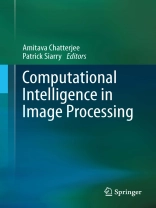Computational intelligence based techniques have firmly established themselves as viable, alternate, mathematical tools for more than a decade. They have been extensively employed in many systems and application domains, among these signal processing, automatic control, industrial and consumer electronics, robotics, finance, manufacturing systems, electric power systems, and power electronics. Image processing is also an extremely potent area which has attracted the attention of many researchers who are interested in the development of new computational intelligence-based techniques and their suitable applications, in both research problems and in real-world problems.
Part I of the book discusses several image preprocessing algorithms; Part II broadly covers image compression algorithms; Part III demonstrates how computational intelligence-based techniques can be effectively utilized for image analysis purposes; and Part IV shows how pattern recognition, classification and clustering-based techniques can be developed for the purpose of image inferencing. The book offers a unified view of the modern computational intelligence techniques required to solve real-world problems and it is suitable as a reference for engineers, researchers and graduate students.
สารบัญ
Part I – Image Preprocessing Algorithms.- Chap. 1 – Improved Digital Image Enhancement Filters Based on Type-2 Neuro-Fuzzy Techniques (Mehmet Emin Yüksel, Alper Baştürk).- Chap. 2 – Locally-Equalized Image Contrast Enhancement Using PSO-Tuned Sectorized Equalization (N.M. Kwok, Q.P. Ha, G. Fang, D. Wang, S.Y. Chen).- Chap. 3 – Hybrid BBO-DE Algorithms for Fuzzy Entropy Based Thresholding (Ilhem Boussaïd, Amitava Chatterjee, Patrick Siarry, Mohamed Ahmed-Nacer).- Chap. 4 – A Genetic Programming Approach for Image Segmentation (Hugo Alberto Perlin, Heitor Silvério Lopes).- Part II – Image Compression Algorithms.- Chap. 5 – Fuzzy Clustering-Based Vector Quantization for Image Compression (George E. Tsekouras, Dimitrios M. Tsolakis).- Chap. 6 – Layers Image Compression and Reconstruction by Fuzzy Transforms (Ferdinando Di Martino, Salvatore Sessa).- Chap. 7 – Modified Bacterial Foraging Optimization Technique for Vector Quantization-Based Image Compression (Nandita Sanyal, Amitava Chatterjee, Sugata Munshi).- Part III – Image Analysis Algorithms.- Chap. 8 – A Fuzzy-Condition-Sensitive Hierarchical Algorithm for Approximate Template Matching in Dynamic Image Sequences (Rajshree Mandal, Anisha Halder, Amit Konar, Atulya K. Nagar).- Chap. 9 – Digital Watermarking Strings with Images Compressed by Fuzzy Relation Equations (Ferdinando Di Martino, Salvatore Sessa).- Chap. 10 – Study on Human Brain Registration Process Using Mutual Information and Evolutionary Algorithms (Mahua Bhattacharya, Arpita Das).- Chap. 11 – On the Use of Stochastic Optimization Algorithms in Image Retrieval Problems (Mattia Broilo, Francesco G.B. De Natale).- Chap. 12 – A Cluster-Based Boosting Strategy for Red Eyes Removal (Sebastiano Battiato, Giovanni Maria Farinella, Mirko Guarnera, Giuseppe Messina, Daniele Ravì).- Part IV – Image Inferencing Algorithms.- Chap. 13 – Classifying Pathological Prostate Images by Fractal Analysis and Texture Features of Multicategories (Po-Whei Huang, Cheng-Hsiung Lee, Phen-Lan Lin).- Chap. 14 – Multiobjective PSO for Hyperspectral Image Clustering (Farid Melgani, Edoardo Pasolli).- Chap. 15 – A Computational Intelligence Approach to Emotion Recognition from the Lip-Contour of a Subject (Anisha Halder, Srishti Shaw, Kanika Orea, Pavel Bhowmik, Aruna Chakraborty, Amit Konar).- Index.
เกี่ยวกับผู้แต่ง
Amitava Chatterjee is an Associate Professor in the Dept. of Electrical Engineering of Jadavpur University in Kolkata, India. He teaches electrical engineering and his research interests include fuzzy control, image processing, robotics, signal processing and stochastic optimization. He has visited overseas on prestigious scholarships and fellowships and has given invited lectures in India, Japan and France. He presently serves as an Associate Editor of the IEEE Transactions on Vehicular Technology. Patrick Siarry is a Professor of Automatics and Informatics at the University of Paris-Est Créteil, where he leads the Image and Signal Processing team in the Laboratoire Images, Signaux et Systèmes Intelligents (Li SSi). He has considerable teaching and research experience in the areas of signal processing, control, artificial intelligence, operations research, and optimization. He presently serves as an Associate Editor of the journal Information Sciences and the journal Engineering Applications of Artificial Intelligence.












